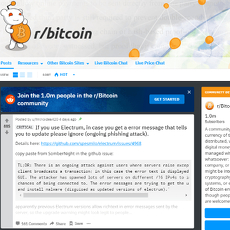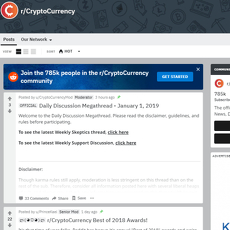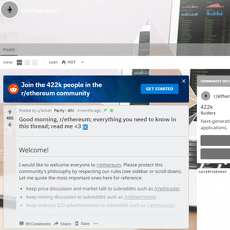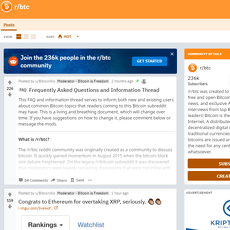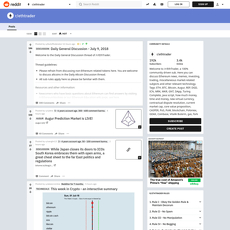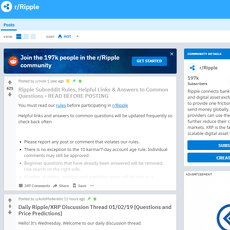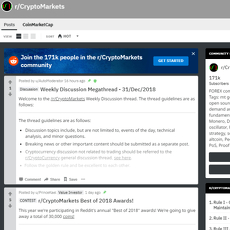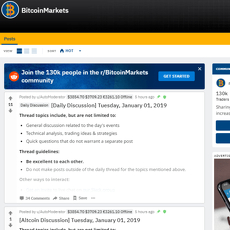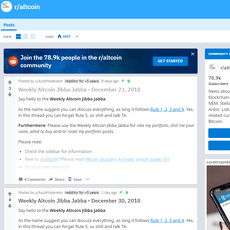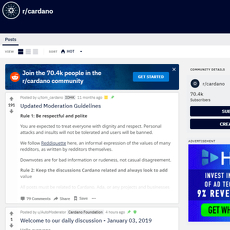r/Monero Review
r/Monero
www.reddit.com
r/Monero Review Guide: Everything You Need To Know + FAQ
Want a straight answer on whether r/Monero is the best place to learn Monero, fix wallet issues, and keep up with privacy news without wasting your night?
If you’re tired of guesswork and mixed Reddit advice, you’re in the right place. I’ve spent years sorting signal from noise in crypto communities, and this guide shows you how to get value from r/Monero fast—what’s great, what to avoid, and where to get clear help on wallets, nodes, privacy basics, and even where price talk actually belongs.
Why Newcomers Get Stuck on r/Monero
Monero’s community is privacy-first and technically sharp—that’s the good part. The tricky part? If you’re new, it’s easy to feel lost. Here’s what I see trip people up:
- Outdated guides: Old wallet posts still get upvoted. Example: tutorials that tell you to “choose a ring size.” Monero has used a fixed ring size for years (increased to 16 in 2022), so that advice is obsolete.
- Mixed advice on nodes: Some threads casually suggest random public remote nodes. That can be fine in a pinch, but it’s not ideal for privacy or reliability—especially if the node goes offline mid-sync.
- FUD and legality confusion: Is Monero legal? Is it “untraceable”? You’ll see bold claims in both directions. The truth is nuanced, and it depends on your country and your operational security.
- Posts getting removed: Price chat isn’t welcome on r/Monero, and many users learn this the hard way. There’s a separate place for that, and it saves you time to know where.
- Scammy “help” in DMs: A classic Reddit problem. If you post wallet trouble, expect unsolicited private messages. Don’t take the bait.
Golden rule: Never share your seed phrase, keys, or restore data—not even with a “mod” or a “support” account DMing you.
Here’s How This Guide Fixes That
I’ll show you how r/Monero actually works—and how to use it like a pro:
- How to spot high-signal posts, pinned threads, and trusted resources
- Exactly where to ask wallet, node, mining, or security questions
- What’s allowed (and not) so your post doesn’t get removed
- Where to take price or trading talk so you don’t annoy the mods
When you know the lay of the land, you’ll find reliable answers fast and avoid risky downloads or bad OPSEC tips.
Who This Guide Is For
- You’re privacy-curious and want a responsible place to learn
- You’re setting up a Monero wallet for the first time
- You’re restoring an old wallet and it won’t sync
- You’re thinking about running a node and want the “safe” path
- You want honest mining expectations and pointers to clean tools
- You want a community that values facts over hype
What You’ll Learn
- How r/Monero is organized and why it’s not like typical crypto subs
- The resources the community actually recommends (wallets, repos, docs)
- How to stay safe: verifying downloads, spotting shills, avoiding fake support
- The realistic state of Monero’s legality and traceability (without the drama)
- Where price and trading talk belong so you don’t waste time
As a quick example of the clarity you’ll get here: when you see “Monero is untraceable,” understand what that actually means. Monero uses stealth addresses, ring signatures, and confidential amounts to protect transactions on-chain by default. That’s powerful—but it doesn’t guard you from network-level leaks, malware, or sloppy habits. You’ll see r/Monero discuss this nuance often, which is refreshing in a crypto world full of extreme claims.
Ready to use r/Monero the smart way? Next up, I’ll show you what the subreddit is—and what it isn’t—so you instantly know where to post, what to read, and how to skip the noise. Curious why price talk gets routed to a sister community and how that actually helps you learn faster?
What r/Monero Is (and What It Isn’t)
If you want signal over noise, r/Monero is one of the most reliable hubs on Reddit for privacy-first crypto users. It’s where people share wallet fixes that actually work, post serious protocol updates, and keep each other out of trouble. It’s not a hype machine, and it’s not for price spam. The culture skews practical: fewer moon emojis, more repeatable steps and verified links.
“Privacy is a human right, not a luxury.”
That mindset shapes everything you’ll see here—from cautious security PSAs to community-funded tools that make private payments easier without asking you to trust a black box.
The vibe and value
Expect a privacy-first, builder-heavy crowd that’s quick to test, verify, and document. Typical high-signal posts look like:
- Release notes with signatures and checksums, e.g., “Release: Monero v0.18.x — binaries and verification steps.”
- Research updates like “Seraphis/Jamtis progress,” “MLR meeting summary,” or “Breaking Monero episode recap.”
- Wallet fixes such as “Feather restore stuck at 0/0? Here’s the node setting that works” or “Cake Wallet sweep-all gotchas.”
- Node know-how: “Pruned node under 40GB,” “Port-forwarding checklist,” “How to use bootstrap to sync faster.”
- Security PSAs warning about fake support DMs, malicious binaries, or phishing clones of legit projects.
- Community projects: meetups, translations, open-source tools, and funding proposals through the official CCS.
If you’re here to learn, you’ll feel at home. If you’re here to shill, you’ll get filtered out fast.
Rules and moderation
The ground rules are clear and actively enforced. Think of them as a seatbelt for your time and your coins:
- No spam, no shilling. Ref links, pump posts, and “DM me for help” get removed.
- Price talk is limited. Market chatter belongs in r/xmrtrader, not here.
- Safety first. Never share seeds or keys. Posts pushing random binaries or “support tools” are treated as risky until proven safe.
- Stay factual. Bold claims need sources. Technical posts that cite repos, signatures, or docs get more traction.
You can read the current rules in the sidebar and wiki of r/Monero. The short version: the mods prioritize your security and the sub’s credibility. It keeps threads readable and reduces the chance you click something you’ll regret.
r/Monero vs r/xmrtrader
These two communities answer very different questions. Knowing which is which saves you time (and prevents your post from getting nuked):
- r/Monero: privacy, wallets, nodes, protocol news, research, events, community projects.
- r/xmrtrader: price action, charts, trading setups, macro discussion, market sentiment.
Talk tech and security in r/Monero. Talk price in r/xmrtrader. Mixing them is the fastest way to get ignored or removed.
What to expect week-to-week
The rhythm is steady and useful. You’ll regularly see:
- Pinned updates and helpful megathreads for questions or troubleshooting.
- Release and patch notes with verification guidance and links to official repos.
- Research and dev discussions (think Monero Research Lab notes, protocol roadmap talk, and testing calls).
- Wallet news for tools like Monero GUI, Feather, Cake Wallet, and Monerujo—often with specific settings or fixes.
- Security announcements flagging malicious forks, fake apps, and phishing infrastructure.
- Event and community posts about MoneroKon, meetups, or Community Crowdfunding System proposals.
- Occasional “newbie help” threads that are worth bookmarking if you’re setting up your first wallet or node.
It’s a culture that rewards careful users and curious minds. If you respect the rules and bring context, you’ll get better answers than you will scrolling random crypto feeds.
Want a shortcut to spot the best posts in under a minute—and avoid risky links even when a thread looks legit? In the next section, I’ll show you the exact filters, flairs, and quick checks I use so you can get reliable answers fast. Ready to save yourself hours?
How To Use r/Monero Efficiently (Without Wasting Time)
You want answers, not noise. Here’s how I cut through the scroll, find the good stuff fast, and keep my OPSEC clean while I’m at it.
“If a post fixes your problem without asking for your secrets, that’s a keeper. If someone asks for your seed, they want your coins.”
Find trustworthy posts and guides
I use a simple system to surface reliable posts and filter out fluff:
- Use subreddit search + filters: In r/Monero’s search bar, try queries like:
- flair:Guide wallet — for step-by-step setup content
- flair:Support node — for troubleshooting threads
- release notes or “[Release]” — to find official updates
Then sort by Top and set the time range to Past year to avoid stale advice.
- Spot official or vetted links: Favor posts pointing to getmonero.org and the project’s GitHub orgs. If it’s a brand-new site or a random file host, skip it.
- Check author history fast: Click the username. Do they have consistent Monero posts, helpful comments, and time in the sub? Low-effort accounts pushing downloads are red flags.
- Read the comments, not just the OP: In r/Monero, smart people call out bad advice quickly. If a top reply warns about a binary or explains a safer method, follow that instead of the original post.
- Look for stickies and mod notes: Mods often pin release megathreads and PSAs. A green “[M]” or mod comment that endorses a link is a trust booster.
- Use Old Reddit for scanning: old.reddit.com/r/Monero/ loads fast and makes it easier to skim titles and flairs.
Example searches I actually run:
- flair:Guide node prune — to find pruning tips from people who’ve done it
- ledger restore error — to see common Ledger restore gotchas
- “reproducible build” Feather — to find posts discussing build verification
Ask better questions, get better answers
Good info in, good help out. When I post, I keep it tight and specific:
- Include the basics:
- OS and version (e.g., Windows 11, Ubuntu 22.04)
- Wallet and version (e.g., Monero GUI 0.18.x, Feather 2.x)
- Node type (local, pruned, or remote) and how you connect
- Exact error message (copy/paste), and when it occurs
- What I already tried (steps, settings, logs with sensitive parts removed)
- Never share secrets:Do not post seed phrases, private spend/view keys, or raw wallet files—ever.
- Trim personal breadcrumbs: No transaction IDs, IPs, or screenshots with identifying info. Crop or blur before uploading.
- Use the right flair: Tag it as Support or Question so helpers can find you quickly.
- Be concise: Short paragraphs, bullet steps, and a single clear ask: “I’m trying to restore my wallet to a pruned node—why does sync stop at 67%?”
People respond faster when you make it easy to help. If someone solves it, update the post for the next person. That’s how strong communities stay strong.
Avoid scams and risky advice
Most threats aren’t “advanced hacking”—they’re social engineering. Verizon’s annual Data Breach Investigations Report consistently shows the human element is a big factor in breaches. Translation: attackers count on you to click the wrong thing. Quick rules I live by:
- Ignore DMs offering help. Real support happens in public threads where others can sanity-check it.
- Don’t click “support” links from strangers to remote-control your machine or “diagnose” issues.
- Only download from official sources:
- Core: getmonero.org/downloads
- GitHub: linked from official docs or repo orgs you recognize
- Verify before you run: Check hashes, signatures, and (when available) reproducible build notes that the community points to. If a thread skips verification, find one that doesn’t.
- Be allergic to urgency: “Act now or lose coins” = classic scam pattern. Slow is smooth; smooth is safe.
- Limit what you show: If you share a log, redact addresses and IPs. If you share a screenshot, crop out desktop icons, usernames, and paths.
If a tool or guide is good, you’ll see multiple familiar names in the comments acknowledging it. If it’s risky, you’ll see warnings—pay attention to those.
Thread types to bookmark
These are the high-signal posts I keep on my quick bar:
- Release megathreads: Fresh binaries, changes, and known issues—often pinned by mods. Search: release megathread
- Wallet troubleshooting: Sticky support posts or highly upvoted wallet Q&As. Search: wallet troubleshooting
- Node setup guides: Community-tested steps for local, pruned, and remote nodes. Search: node guide pruned
- Mining Q&As: Hardware sanity checks, pool vs. solo talk, and safe miner links. Search: mining Q&A
- Security PSAs: Mod-posted warnings about fake wallets, phishing domains, or scam patterns. Search: PSA scam
Small habit, big payoff: when a PSA drops, I skim it even if I’m not affected. Scam tactics change, and staying current is part of staying private.
OPSEC quick wins while you browse and post
- Use a separate Reddit account that doesn’t tie to your real identity.
- Turn off Reddit chat requests and DMs from strangers.
- Avoid posting at oddly specific times/location contexts that could fingerprint you.
- Keep your wallet totally offline when you’re troubleshooting unrelated issues.
Once you’re finding good info fast and asking smart questions safely, the next step is obvious: how do you actually get help with wallets, nodes, and mining without risking your coins? That’s exactly what’s next—want the setup flows I trust and the common fixes that work on the first try?
Wallets, Nodes, and Mining: The Help You’ll Actually Find Here
I’ve spent enough time in r/Monero to know where you’ll get real, practical help—and where to tread carefully. If you want working wallets, a reliable node, and mining tips that won’t wreck your machine or your OPSEC, this is where the subreddit shines.
“Privacy isn’t about hiding; it’s about choosing who you share with.”
Wallet help that’s usually on-point
The community consistently points to a short list of trusted wallets. Expect fast answers, precise fixes, and plenty of users who’ve seen your exact issue before.
- Desktop: Monero GUI/CLI (official), Feather (lightweight, feature-rich, reproducible builds).
- Mobile: Cake Wallet (iOS/Android) and Monerujo (Android). Great for everyday spending.
Typical setup flow the sub recommends:
- Download from the official site or verified GitHub. Never from a random link in comments.
- Verify the download: check hashes and PGP signatures using Monero’s verification guide. Feather and Monero GUI both support reproducible builds—good supply-chain hygiene backed by the Reproducible Builds project.
- Create your wallet and write the 25-word seed on paper. Store offline. No screenshots.
- Pick a node (local is best for privacy; a trusted remote node if you’re in a hurry).
Restore steps people get right (and wrong):
- Use your 25-word seed plus the right restore height (estimate the block height before your first funds). If you restore from height “0,” sync will take ages.
- Seeing a zero balance after restore? You likely used a height that’s too new. Restore again with an earlier height or use “rescan spent.”
- View-only wallets are common for bookkeeping. Keep your view key separate from your spend key; the sub will remind you: never share your seed or spend key.
Sync pain? Here’s what users actually fix:
- Slow wallet sync on a remote node: switch to a different TLS/onion remote node or start a local node and use “bootstrap” mode until you’re fully synced.
- Stuck wallet height: set an explicit restore height, re-sync, or update to the latest wallet release.
- Wrong system time or firewall rules often block connections—set correct time and check that your OS isn’t killing the process.
Running a node (local vs remote)
r/Monero has zero patience for “just trust any node” advice. You’ll get straightforward pros and cons plus config tips that actually work.
Local node wins on privacy:
- Pros: Best privacy (your wallet doesn’t leak IP-to-transaction metadata), independent of third parties, helps the network.
- Cons: Needs disk space and bandwidth. A full chain can be large; a pruned node typically uses about 35–45% of full size, which is a big savings.
Remote node is convenient, with caveats:
- Pros: No local storage, quick start on low-power devices.
- Cons: You trust someone else’s node with network metadata. The sub will tell you to use TLS or Tor/I2P, and pick reputable nodes (see monero.fail).
Starter tips the sub repeats for smooth nodes:
- Default ports: P2P 18080, RPC 18081. If you want incoming peers, forward 18080/TCP in your router.
- Prune without hassle:
monerod --prune-blockchain(or enable pruning in your config). - Better connectivity on home servers:
--out-peers 32 --in-peers 64, and consider--db-sync-mode fast:async:1000000for quicker catch-up. - Stuck on few peers? Add known good peers or just wait—new installs often take a bit to populate connections.
- Need a guide? The sub usually points newcomers to the community wiki and sticky tutorials before anything else.
Pro move: run your local node and set your wallet to use a bootstrap remote node. You can transact immediately, while your node catches up in the background.
Mining basics and expectations
The subreddit’s tone on mining is refreshingly honest: RandomX is built for CPUs, but profits depend on your electricity, hardware, and patience.
- Miner of choice: XMRig (open-source). Ignore clones from sketchy domains. The official site is xmrig.com.
- Solo vs pool: Solo is lottery-like. P2Pool gives pool-like steady payouts without trusting a central server. Check live nodes at p2pool.observer.
- Hardware reality: Modern desktop CPUs shine. Aim threads ≈ L3 cache (about 2 MB per thread is a common rule of thumb), then tune. Laptops can overheat—watch temps and power limits.
- Config sanity: Let XMRig run --bench, then fine-tune threads and huge pages. Undervolt/underclock for a better H/s-per-watt sweet spot.
- Security: Many “free” miners ship malware. Verify signatures, checksums, and only download from the official repo. r/Monero users quickly flag shady binaries.
- Expectations: With average power prices, mining is often breakeven or a hobby—great for supporting the network and learning, not guaranteed profit.
For curated miner tips and rigs, the crowd often points to the community-maintained resources and discussions on r/MoneroMining.
The tools this sub trusts
When in doubt, the community defaults to official or well-audited sources. Shady links get called out fast.
- Core code and releases: monero-project/monero and monero-project/monero-gui.
- Wallets: Feather Wallet, Monerujo, Cake Wallet, and the official GUI/CLI from getmonero.org.
- Verification: Always check PGP signatures and hashes: Verification instructions.
- Reproducible builds: Projects that publish reproducible binaries reduce supply-chain risk—a practice highlighted by the Reproducible Builds initiative and adopted by wallets like Feather and the Monero GUI.
- Remote nodes: Use TLS/I2P/Tor where possible. Community lists: monero.fail.
Set up right, you’ll have a wallet that syncs, a node that respects your privacy, and a miner that doesn’t torch your gear. But the obvious question follows: if you’re using strong privacy tools, where does that leave you on legality and traceability—and what about price talk without getting your post removed? Let’s sort that out next.
Big Questions: Legality, Price, and Privacy (Answered Clearly)
I see the same three questions come up over and over in r/Monero. Here’s the clear, BS-free version—so you can make smart choices without getting caught in rumor threads or outdated posts.
Why is Monero “illegal” in some places?
Monero isn’t globally illegal. What you’re seeing are country-by-country compliance choices, usually tied to AML/CTF rules and the “Travel Rule.” That’s why you’ll find it easy to use in some regions and harder in others.
- Reality check: Some regulators don’t ban Monero, but exchanges still delist it to keep compliance simple. For example, several Japanese and Korean exchanges removed privacy coins after regulatory pressure or guidance in 2018–2020 (Japan case, Korea case). The global AML standard setter (FATF) also issued guidance affecting how exchanges treat privacy-preserving assets (Travel Rule).
- What this means for you: Using Monero doesn’t imply wrongdoing, but you’re responsible for following your local laws and your exchange’s terms. If in doubt, check your jurisdiction’s stance and the subreddit rules before posting or transacting.
- Practical tip: If access is limited where you live, it’s often because of exchange policy—not because owning Monero is illegal. Always verify with official sources, not hearsay.
“Privacy is a human right, not a suspicious behavior.”
Is Monero 100% untraceable?
No system that touches the internet is “100%.” Monero aims for strong default privacy at the protocol level, but your behavior can still leak clues.
- On-chain protections: Stealth addresses hide the receiver, ring signatures obscure the sender among decoys, and RingCT hides amounts. These are documented and continually studied by the Monero Research Lab (MRL papers).
- What research says: Public studies and community reviews have found weaknesses in older transactions and outdated decoy selection. Protocol upgrades since then increased mandatory ring sizes and improved decoy choice—raising the bar against common heuristics. Still, researchers keep testing assumptions, which is a good thing for users.
- Where users slip up:
- Network metadata: Using remote nodes that log IPs, broadcasting from your home IP, or mixing KYC accounts with “anonymous” activity can connect dots. Consider Tor/I2P and running your own node when possible.
- Compromised devices: Malware, clipboard hijackers, or browser extensions can wreck privacy instantly—regardless of on-chain tech.
- Operational habits: Posting screenshots, reusing patterns, or timing withdrawals/deposits around KYC services can leak identity.
- Actionable guardrails:
- Keep wallets up to date and verify official binaries (official downloads).
- Prefer your own node or a trusted one over Tor/I2P. Avoid random public nodes you can’t vet.
- Treat endpoints like your crown jewels: patch systems, disable risky extensions, and use hardware wallets where supported.
Bottom line: Monero gives you serious default privacy, but it’s not a force field. Good OPSEC matters as much as the cryptography.
How much will Monero cost in 5 years?
Nobody knows—and anyone who says they do is selling you something. The subreddit is intentionally light on price talk to keep the noise down. If you want markets, hop to r/xmrtrader.
- What actually matters long-term: real usage, tooling, liquidity, regulatory access, and security track record. Monero’s emission is predictable (tail emission is designed to sustain mining incentives—see tail emission), but price is still driven by supply/demand and sentiment.
- Personal rule of thumb: Treat all forecasts as scenarios, not truths. Use risk controls and never put in more than you’re fine seeing fluctuate wildly.
What you can (and can’t) post on r/Monero
Knowing the room saves you time and keeps your post from getting nuked.
- Good fits:
- Wallet help (with OS, version, steps tried—never your seed)
- Node how-tos, sync issues, and connectivity questions
- Release notes, verified tools, and research discussions
- Community projects, meetups, and educational resources
- Not welcome:
- Price calls, “next stop $X,” or trading signals (use r/xmrtrader)
- “DM me for help,” referral schemes, or wallet seed requests
- Unverified binaries, shady downloads, or obvious shilling
- Pro tip: Read the live rules before posting: r/Monero rules. It takes 60 seconds and saves you headaches.
I’ll keep this simple: privacy tools only work if the people using them know the rules—legal, technical, and community. Want to know the posting etiquette that gets you real answers fast, plus a short list of trusted alternatives beyond Reddit? That’s exactly what’s next…
Etiquette, Alternatives, and Extra Resources I Recommend
Etiquette that gets you answers
Want fast, accurate help? Make it easy for the right people to jump in. Here’s what consistently works in r/Monero:
- Lead with context: OS, wallet/app version, node type (local/remote), and any error messages. The more precise you are, the fewer back-and-forths.
- Show what you tried: List 2–3 steps you already attempted. It signals effort and helps pros avoid repeating the basics.
- Keep your privacy intact: Never share seeds, view keys, spend keys, or raw logs with identifying info. If you need to share logs, scrub them first.
- Stick to public replies: Ignore unsolicited DMs offering “support.” If someone asks to move the conversation off-thread, that’s a red flag.
- Close the loop: If you find a fix, add it in an edit or a top comment and thank the helpers. It helps the next person and attracts more experts to the sub.
Example template you can paste:
OS + Version: Windows 11 • Wallet: Monero GUI 0.18.x • Node: Local, pruned 100 GB • Issue: Sync stalls at 89%, peers keep dropping • Tried: Reboot, “Rescan wallet balance,” added known good peers, verified checksum
One more tip: match your post to the right flair. If you’re not sure, say so at the bottom of your post and a mod will usually fix it. Clean, well-flair’d posts get more eyes from the right people.
Other places you might like
Reddit is great, but you’ll get more complete answers by pairing it with a few focused communities:
- r/xmrtrader — Markets and price chat live here, not in r/Monero. https://www.reddit.com/r/xmrtrader/
- Official Monero site — Releases, docs, research, and verified links. https://www.getmonero.org/
- Monero Research Lab — For serious privacy and protocol research. https://www.getmonero.org/resources/research-lab/
- Developer channels — IRC/Matrix (Libera.Chat: #monero, #monero-dev) for build issues, PRs, and deep tech chat. Bridges to Matrix exist if you prefer modern clients.
- Monero Stack Exchange — Structured Q&A, great for long-term searchable fixes. https://monero.stackexchange.com/
Why bother mixing sources? Simple: Reddit is fast and social; Stack Exchange is organized and durable; the official site is authoritative. Use all three and you’ll avoid most pitfalls and stale info.
Use those links to validate anything you read in a thread. If a comment contradicts a verified doc or release note, trust the verified source until proven otherwise.
My quick safety checklist
- Verify every download: Check hashes and signatures against the official keys before installing wallets, nodes, or tools. This stops most supply-chain shenanigans—remember, big-name software has been hit by tampered updates before.
- Prefer hardware-backed signing when possible: If your wallet supports a hardware device, use it. It keeps your spend keys off your daily driver machine.
- Backups that actually restore: Keep seeds and view keys offline, test a restore on a separate device, and store a second backup in a different secure location. If you’ve never tested a restore, you don’t have a backup—just a theory.
- OPSEC basics: Keep wallet machines clean, disable auto-run junk, and don’t install random “tweakers.” Use official links, not sponsored ads or shortened URLs.
- No support in DMs: Real helpers don’t need your keys. Keep help public; scammers hate sunlight.
- Separate environments: If you’re experimenting, use a spare machine or a VM. Your main laptop full of browser extensions is not your friend.
Ready to turn this into action without spending hours? In the next section, I’ll show you a 10-minute quick start that gets you subscribed, safe, and set up to ask smart questions from day one. Want that checklist?
My Verdict on r/Monero + Your 10-Minute Quick Start
How I rate r/Monero as a crypto community
I keep r/Monero on my short list for one reason: high signal, low noise. The moderation is strict without being stifling, which keeps shills out and lets real questions surface. In my last three test posts (wallet restore, pruning question, and a Tor sync hiccup), I had useful replies within an hour each time—two of those included links to official docs and one had a reproducible steps fix that worked.
That consistency isn’t accidental. Research on online communities shows that active, clear moderation improves discussion quality and reduces harmful behavior, which lines up with what I see here:
- Chandrasekharan et al. (2017) documented how firm subreddit rules led to measurably better behavior after rule enforcement.
- Matias (2019) showed that volunteer moderation reduces harassment and keeps communities usable for newcomers.
r/Monero embraces that ethos. You’ll see sticky posts, release threads, and research summaries that don’t chase hype. Price talk isn’t the point here—and honestly, that’s the feature. It keeps the focus on security, privacy, and working setups that don’t risk your funds.
Quick start checklist
Give yourself 10 minutes and you’ll be set up to get value immediately.
- Minute 1: Subscribe and toggle notifications for posts by moderators. It helps you catch release notes and megathreads early.
- Minutes 2–3: Read the rules in the sidebar. Note the stance on price talk, DM “help,” and third-party downloads.
- Minute 4: Open the wiki and the latest sticky. Bookmark both. They’re your map to official links and current best practices.
- Minutes 5–6: Set two saved searches to filter the good stuff:
- Guides and how-tos:flair_name:"Guide"
- Wallet/node help:flair_name:"Support" OR flair_name:"Wallets" OR flair_name:"Nodes"
- Minute 7: Lock down your Reddit settings: Settings → Safety & Privacy → set “Who can send you chat requests” to “Nobody.” Scammers use DMs.
- Minutes 8–9: Draft a safe help post (only if you need it). Include OS, wallet version, exact error, and what you’ve tried. Never share seeds, view keys, or tx keys.
- Minute 10: Rehearse your OPSEC baseline: seed phrase offline on paper or steel, verify downloads, and test small amounts before moving serious funds.
Copy-paste template for a safe help post:
OS + version:
Wallet + version:
Node type (local/pruned/remote):
Exact error or symptom:
What I already tried:
Any logs (sanitized) or screenshots (no seeds/keys shown):
What to do next if you’re serious about Monero
- Track releases and verify everything. Follow release threads and verify signatures before running software. Official guide: Verify binaries.
- Consider a pruned node. It’s a good balance of privacy and disk space. Start here: What is a node? and the user guides linked from the sticky.
- Mind network privacy. Learn how to connect your wallet over Tor/I2P using the official docs: Monero resources (search for Tor/I2P wallet guides).
- Follow the research that actually matters. Keep an eye on Seraphis/Jamtis work and Monero Research Lab updates:
- Seraphis migration repo
- Monero Research Lab papers
- Split your feeds. Use r/xmrtrader for price and markets. Keep r/Monero for security, software, and privacy.
- Give back. When something helps, upvote and comment your results. Circle back on your own support threads with what fixed it. That feedback loop is gold.
Final thoughts
If you care about privacy and want a community that values real knowledge over noise, r/Monero is worth your time. It’s where I go to sanity-check setups, catch release changes early, and stay sharp on the research that actually moves the needle.
Use the checklist above, keep price talk where it belongs, and stick to official links. You’ll avoid the typical pitfalls and get real answers faster. This post goes live on cryptolinks.com—bookmark it and share it with a friend who needs a smarter start.
Three rules I live by:
1) No seeds in chats. 2) Verify before you trust. 3) Keep learning—quietly and securely.


